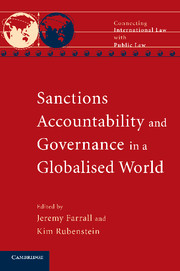Book contents
- Frontmatter
- Contents
- Contributors
- Series editors' preface
- Editors' preface
- Introduction: Filling or falling between the cracks? Law's potential
- PART I Setting down the foundations
- PART II Internationalising public law
- PART III Implementing Security Council sanctions
- PART IV The place of corporations
- PART V The role of lawyers
- PART VI Public law and public policy
- PART VII Parallel case studies
- Concluding remarks
- Bibliography
- Index
Series editors' preface
Published online by Cambridge University Press: 05 October 2010
- Frontmatter
- Contents
- Contributors
- Series editors' preface
- Editors' preface
- Introduction: Filling or falling between the cracks? Law's potential
- PART I Setting down the foundations
- PART II Internationalising public law
- PART III Implementing Security Council sanctions
- PART IV The place of corporations
- PART V The role of lawyers
- PART VI Public law and public policy
- PART VII Parallel case studies
- Concluding remarks
- Bibliography
- Index
Summary
The idea for this series began in June 2005, when Kim Rubenstein applied for the position of Professor and Director of the Centre for International and Public law at the ANU College of Law. The Centre is recognised as the leading Australian academic centre bringing together public lawyers (constitutional and administrative law broadly, but also specific areas of government regulation) and international lawyers from around the world. Established in 1990 with its inaugural director Professor Philip Alston, the impact of the Centre and its work can be seen further at www.law.anu.edu.au/cipl/.
In discussing with the law faculty ideas for the Centre's direction, Kim raised the concept which underpins this series. Each volume flows from workshops bringing public and international lawyers and public and international policy makers together for interdisciplinary discussion on selected topics and themes. The workshops attract both established scholars and outstanding early scholars. At each of the workshops participants address specific questions and issues, developing each other's understandings and knowledge about public and international law and policy and the links between the disciplines as they intersect with the chosen subject. These papers are discussed and reviewed at the workshop collaboratively, then after the workshop the papers are peer-reviewed and revised for the final editing phase of the overall manuscript.
The series seeks to promote a deeper understanding of how public and international law intersect, both in theory and in practice. Until now, international and public law have mainly overlapped in discussions on how international law is implemented domestically.
- Type
- Chapter
- Information
- Sanctions, Accountability and Governance in a Globalised World , pp. xvii - xviiiPublisher: Cambridge University PressPrint publication year: 2009

